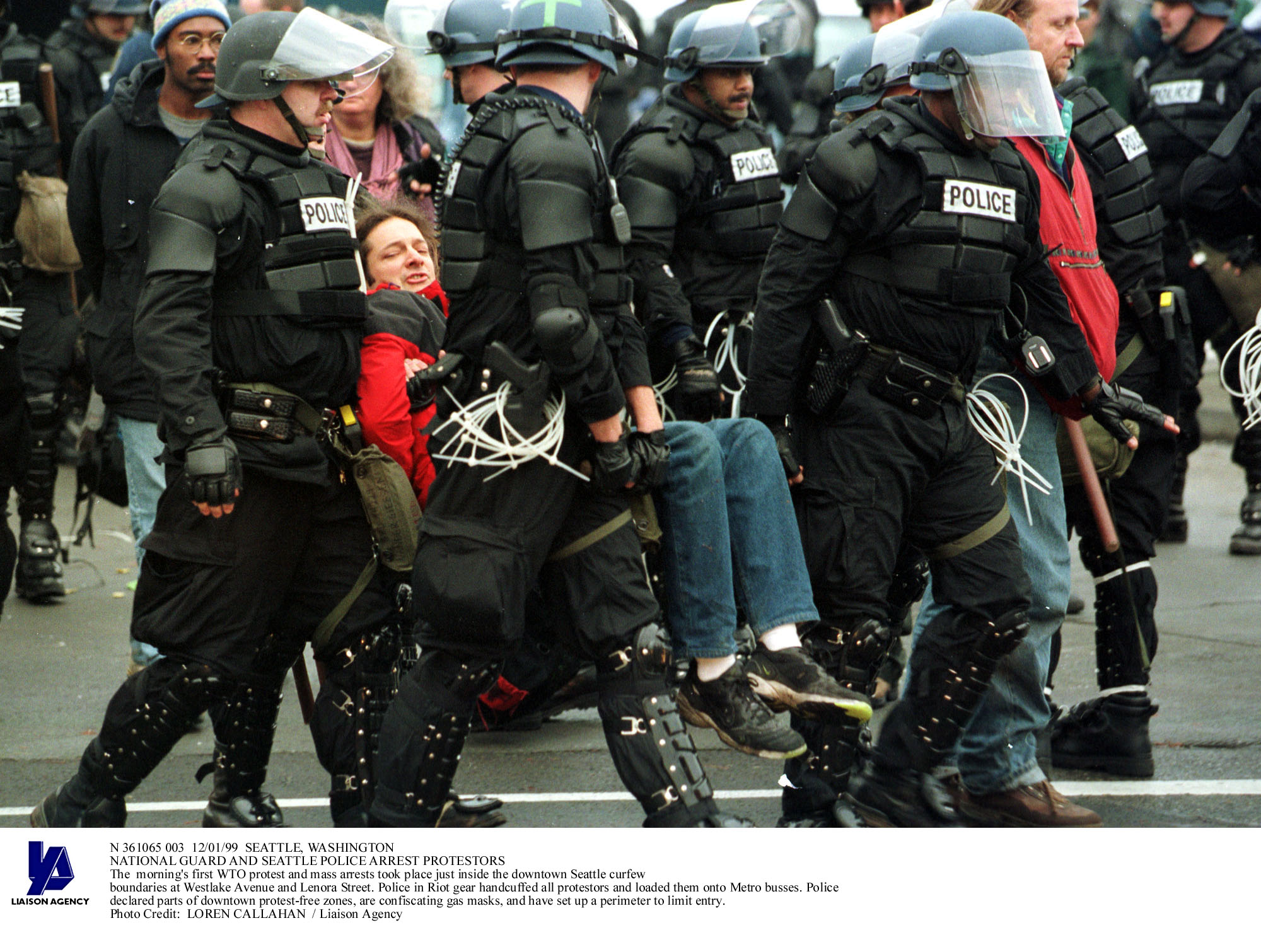
I retired as Seattle’s police chief shortly after I presided over a response to the 1999 WTO protests not unlike the police reaction in Ferguson, Missouri. In time, I came to believe my authorization to send in officers in riot gear and to use tear gas on protesters was the worst decision of my 34-year career as a cop.
Today, the entire institution of policing seems hell-bent on repeating my mistakes.
Many local law enforcement agencies are now outfitted and behave like small armies. This is not good, and the federal government shares much of the blame. With the advent of the drug war and especially since 9/11, the Department of Defense has been more than generous in gifts of surplus military items to the locals: armored personnel carriers, MRAPs (mine-resistant, ambush protected vehicles), and a wide assortment of military weaponry.
The causes of the continuing unrest in Ferguson are many: the shooting death of an unarmed teenager, of course, along with persistent racial bigotry and discrimination, crushing poverty, failing schools, high unemployment… But it was the police department’s precipitous, militarized response last weekend that transformed peaceful vigils and protests into a siege of proportions never before seen in that St. Louis suburb.
That, and an abiding, preexisting condition of deep distrust of the city’s police officers.
Throughout the nation, in neighborhoods that have been historically neglected or oppressed by their police, the military mentality has exacerbated an already dreadful relationship. And it has all but destroyed “community policing,” a promising program that seeks to create authentic problem-solving partnerships between police and community.
We should not be surprised that officers of the Ferguson Police Department responded aggressively, militarily, to the original protests. It’s what cops do. They are conditioned to believe they are in control and that they must maintain that control, at all costs. They come to “own” the streets they patrol. The cop culture produces an attitude that, “We’re the police, and you’re not. We will decide what’s best for the community.” Even if it means hitting the family home of a suspected low-level, nonviolent drug offender with maximum military might, or using dogs for crowd control, or violating the civil liberties and human rights of fellow citizens.
Of course, at times, there is no substitute for military equipment and military-like tactics. Picture armed and barricaded suspects, school shootings, and other urgent, life-and-death situations. Make no mistake, America’s cities need carefully selected, well trained, highly self-disciplined police officers to confront these dangerous situations.
The problem comes when local law enforcement embraces militaristic tactics as its default position. Especially in situations, like Ferguson, where de-escalation efforts would have made infinitely better sense.
Picture Captain Ron Johnson standing before that bank of microphones at the beginning, not the end of the week. See him walking, in his everyday uniform, with protestors, smiling, hugging, saying, as he did in church yesterday, “You are my family…I am you.” A powerful statement in a town whose African-American population is 70 percent and whose police force of 53 numbers only three black cops.
Had Ferguson police responded with openness, had they listened and listened then listened some more, had they been as prompt and as forthcoming and thorough in their explanations as circumstances would allow, I am convinced that the peace of the community could have been maintained, its residents allowed to mourn the death of another young black man, even as they insisted on answers from their local police.
American policing, almost since its inception, has operated as a closed, paramilitary-bureaucratic institution. What we’re seeing on the streets of Ferguson is nothing new. We’ve seen it in the nineteenth and twentieth centuries in the police response to labor, antiwar, civil rights, and campus demonstrations. What’s new is just how militaristic everyday policing has become in the early years of the twenty-first century.
But all is not lost. There are many ways to make police more responsible to the communities they serve. Let’s end the drug war that encourages the targeting of poor people, young people, people of color. Let’s flatten steep police hierarchies of power that discourage open and forthright communication within the ranks, and between the people and the police. Let’s invest civilian review boards with investigative and subpoena powers that allow them real oversight. Let’s insist on meaningful community representation in all aspects of police policy-making, program development, priority setting and crisis management.
And, most important, let’s encourage good people to go into policing. They can reform things from the inside and provide living exemplars of what good policing can be.
Norm Stamper was Seattle police chief from 1994-2000. He is the author of Breaking Rank: A Top Cop’s Exposé of American Policing and is an advisory board member of Law Enforcement Against Prohibition.
More Must-Reads from TIME
- Donald Trump Is TIME's 2024 Person of the Year
- Why We Chose Trump as Person of the Year
- Is Intermittent Fasting Good or Bad for You?
- The 100 Must-Read Books of 2024
- The 20 Best Christmas TV Episodes
- Column: If Optimism Feels Ridiculous Now, Try Hope
- The Future of Climate Action Is Trade Policy
- Merle Bombardieri Is Helping People Make the Baby Decision
Contact us at letters@time.com